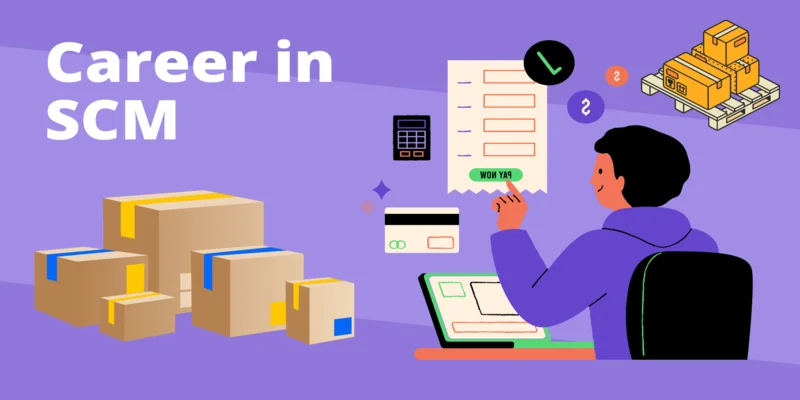Many professionals opt for supply chain management jobs as this career involves a wide and ever-broadening range of technologies. This industry facilitates identifying new opportunities in various sectors such as transportation, manufacturing and logistics.
However, as a result of emerging technologies, such as the Internet of Things (IoT), cognitive computing, and virtual reality, it is essential to have data-informed strategies in place for the foreseeable future that will go well beyond traditional best practices. This will help ensure effective supply chain operations.
There are many reasons why choosing a supply chain management job could be a good career move, such as diverse career opportunities, relatively low barriers to entry, opportunities for advancement & growth, international travel, and handsome pay.
The distinctions between execution and planning are becoming hazier as real-time technologies expand. Cloud technologies have accelerated the adoption of more recent technological advancements. The complexity of supply chains is increasing as a result of this technological change.
Are you thinking to pursue this career? This article will discuss some tips and recommendations from industry experts before joining the supply chain industry.
Advice from Industry Experts to Young Professionals in Supply Chain Management
The increasing demand for logistics is expected to create around 10 million jobs in India by 2027. Thus, here are some pieces of advice from industry experts that will help you get supply chain management jobs seamlessly:
1. Knowledge of IT and Automation
Very few supply chains nowadays are successful without the aid of high-tech technologies like enterprise resource planning (ERP) and warehouse management systems. As a result, in order to work in a supply chain network, you must have at least a basic understanding of IT, especially if you plan to take a leadership position.
The usage of enterprise software programs like WMS, TMS, and ERP, as well as analytics software, which is quickly becoming a mainstay of leadership decision support, are skills you’ll need to possess if you want to be a supply chain leader.
You are also expected to navigate your corporation’s business intelligence and ERP applications on your own. Your need for technological knowledge goes beyond practical use as well.
2. Understand the Economy and Market
A lot of markets that earlier used to operate at the local or regional level have expanded globally, and the supply chains that support them have also followed the same trend. If you wish to be successful, you will need to have an in-depth knowledge of the market dynamics affecting your sector and business.
Understanding what influences supply, demand, and pricing for the goods and services offered by your organization and its competitors will help you plan, organize, operate and lead a supply chain team efficiently. These factors impact many supply chain management components, such as the cost of items sold and the cost of customer service for your business.
3. Cost to Serve
If you can measure the impact of your supply-chain leadership decisions on your bottom line, you will be at a significant advantage and can excel as a leader. For instance, very few businesses emphasize the actual expenses related to providing customer service.
One-size-fits-all customer service is frequently the outcome of this carelessness, which invariably results in the overservicing of specific clients and the under-servicing of others. A single service offering can potentially reduce profitability, possibly leading to a scenario in which sales result in losses rather than profits due to logistical costs.

4. Receptive
If you are open to suggestions, other people will also participate and come up with creative ideas. Your adaptability will inspire others with creative ideas as they know you will execute them if those ideas help the business.
Flexibility will ensure change, frequently referred to as the only constant in supply chain management, and it won’t faze or stress you out excessively. Your staff will consequently be motivated to accept change instead of fighting it.
Flexibility is one of the soft talents that sets effective supply chain leaders apart. That’s due to the evolving nature of supply chain operations as well as the fact that things don’t always go as planned—far from it, to be honest.
5. Project Management
As a supply chain leader, you’ll require a wide range of project management abilities in addition to adaptability. A lot depends on the leadership position you occupy. But if you are on the fast track to the top, you will likely hold many management positions along the way, the majority of which will occasionally require you to lead projects.
The necessity for negotiation skills comes from the possibility that you might occasionally be asked to support project business cases. Understanding risk management will enable you to ask the correct questions regarding the proposal and business case while determining whether to approve the desired project.
6. Team Work
The talents can be learned, but a word of caution is in order. Don’t opt for supply chain management jobs if you don’t like working in teams and forming relationships with other individuals on a professional level.
Being critical of oneself is all right as long as you have the will to put effort into your growth and the drive to learn what you need to learn. The first half of the battle to be a successful supply chain leader is having a strong sense of collaboration and a love of social contact.
Last but not least, even though it may seem obvious, you should not forget that the growth of the person whose skills and abilities will most impact you will always be you.
7. The Skill of Negotiation
If you want to move with the trend and wish to be a modern supply chain leader, you’ll have to connect efficiently with people inside and outside of your company, in addition to working with your reports and coworkers. Plus, negotiating during internal and external contracts will also be necessary.
Supply chain leaders have to engage in negotiations frequently. Even if you’re not doing so individually, you’ll likely be in situations where you’re a member of a group trying to break a deal.
Tips to Ace Supply Chain Management Jobs

If you are looking for supply chain management jobs and build a career around it, you need to be committed and follow these seven pillars:
· Diploma
Having a degree will help you get a good job and a better position in any SCM company. Most companies will first look at the ‘Education’ part of your CV before moving forward with your application.
· Willingness
Without saying, willingness and passion for working in any sector are important for success. You need to have the interest and zeal to grow.
· Skills
It is essential to have strategic skills as they help you start your career well and reach your goals. Various skills required to excel in the SCM sector are analytical skills, inventory management, planning, forecasting, management, project management, and computer tools.
· Experience
You can explore and experience all areas of the SCM process, and then you can decide on the area in which you are passionate about and want to pursue your career. This will help you learn more about the supply chain industry and boost your career.
· Strategies
You need to plan what you want so that you can create the strategy accordingly. Let us understand this with the help of an example: As a beginner, you wish to become a logistics coordinator, and a medium-sized company is offering you the same position. But a large company is offering you the position of inventory associate. What will you do? Well, go as per your goals and opt for the position you long for.
· Performance
Once you have the right skills, required experience, and willingness to work, you just have to be efficient in your job and perform well. Good performance will help you pave the path to success.
· Personal Development
Never put aside your personal development, irrespective of the profession you are in. Personal development builds confidence, increases motivation, and helps you progress.
Conclusion
Since many of the abilities in this set of skills are rarely taught outside of the industry, they might be challenging to acquire without extensive supply chain experience. A specialized supply chain and logistics education curriculum can be your best choice.
Employing practical problem-solving techniques, realistic instances of often committed errors, and advice on how to prevent them can aid in your pragmatic learning of each supply chain area. There are numerous supply chain management jobs, which also include entry-level positions that can quickly turn into senior positions due to the rising demand for qualified, diligent professionals.
FAQs
- What is supply chain management?
Supply chain management, or SCM is the meticulous oversight of each supply chain step, including the management of raw goods, data, and finances.
- What purpose does SCM serve?
From purchasing raw materials to selling finished goods, supply chain management is crucial to the manufacturing system.
- What is logistics?
The fastest, most effective, and most economical method of transporting items from one point in the supply chain to the next is called logistics. Until the delivery, the logistics process can monitor the movement of the items.

Nikita Sikri is a content specialist who simplifies complex ideas and produces SEO-driven content for SaaS and AI-writing platforms. Her strategic writing skills generate leads, nurture them and boost ROI.



